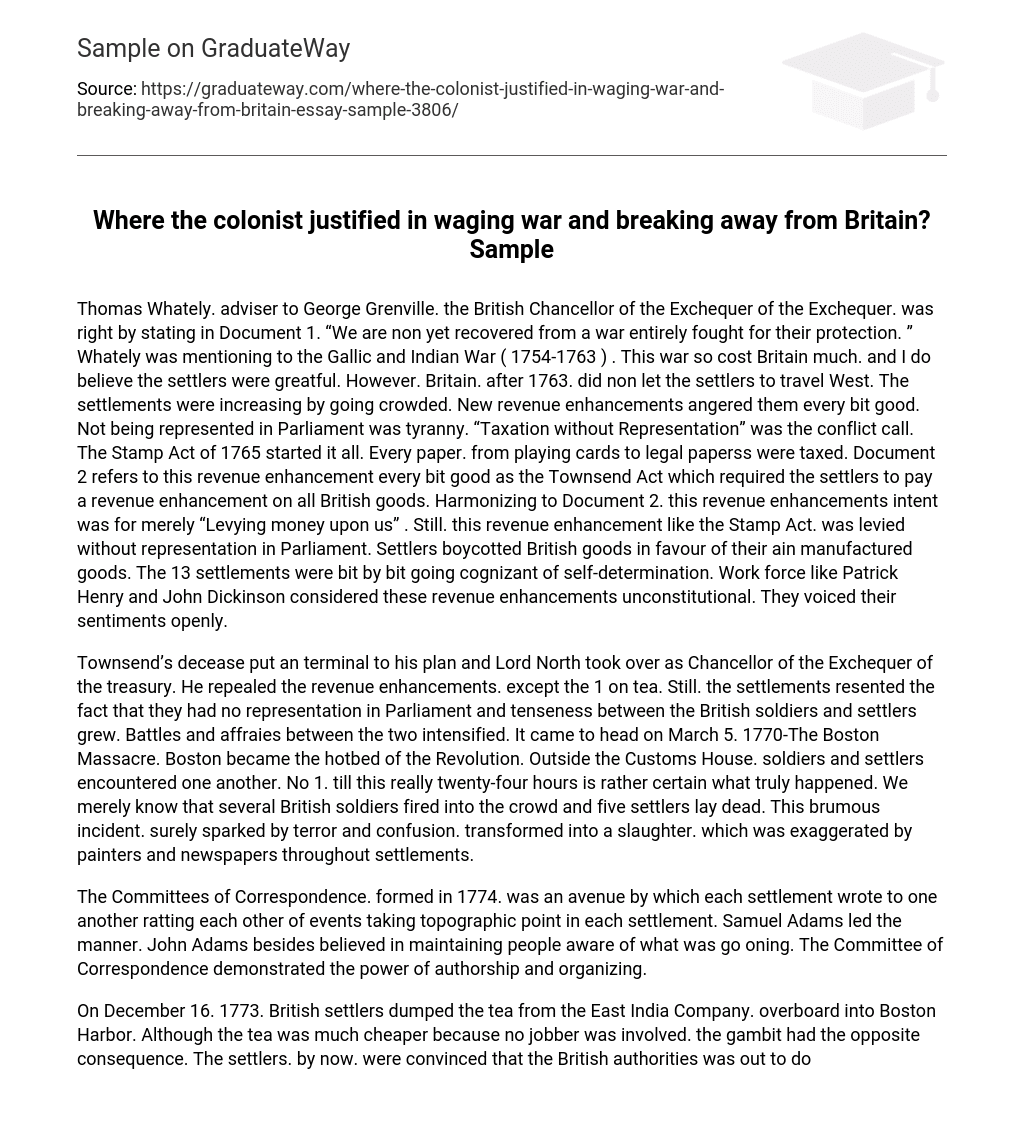Thomas Whately. adviser to George Grenville. the British Chancellor of the Exchequer of the Exchequer. was right by stating in Document 1. “We are non yet recovered from a war entirely fought for their protection. ” Whately was mentioning to the Gallic and Indian War ( 1754-1763 ) . This war so cost Britain much. and I do believe the settlers were greatful. However. Britain. after 1763. did non let the settlers to travel West. The settlements were increasing by going crowded. New revenue enhancements angered them every bit good. Not being represented in Parliament was tyranny. “Taxation without Representation” was the conflict call. The Stamp Act of 1765 started it all. Every paper. from playing cards to legal paperss were taxed. Document 2 refers to this revenue enhancement every bit good as the Townsend Act which required the settlers to pay a revenue enhancement on all British goods. Harmonizing to Document 2. this revenue enhancements intent was for merely “Levying money upon us” . Still. this revenue enhancement like the Stamp Act. was levied without representation in Parliament. Settlers boycotted British goods in favour of their ain manufactured goods. The 13 settlements were bit by bit going cognizant of self-determination. Work force like Patrick Henry and John Dickinson considered these revenue enhancements unconstitutional. They voiced their sentiments openly.
Townsend’s decease put an terminal to his plan and Lord North took over as Chancellor of the Exchequer of the treasury. He repealed the revenue enhancements. except the 1 on tea. Still. the settlements resented the fact that they had no representation in Parliament and tenseness between the British soldiers and settlers grew. Battles and affraies between the two intensified. It came to head on March 5. 1770-The Boston Massacre. Boston became the hotbed of the Revolution. Outside the Customs House. soldiers and settlers encountered one another. No 1. till this really twenty-four hours is rather certain what truly happened. We merely know that several British soldiers fired into the crowd and five settlers lay dead. This brumous incident. surely sparked by terror and confusion. transformed into a slaughter. which was exaggerated by painters and newspapers throughout settlements.
The Committees of Correspondence. formed in 1774. was an avenue by which each settlement wrote to one another ratting each other of events taking topographic point in each settlement. Samuel Adams led the manner. John Adams besides believed in maintaining people aware of what was go oning. The Committee of Correspondence demonstrated the power of authorship and organizing.
On December 16. 1773. British settlers dumped the tea from the East India Company. overboard into Boston Harbor. Although the tea was much cheaper because no jobber was involved. the gambit had the opposite consequence. The settlers. by now. were convinced that the British authorities was out to do slaves of them as stated in Document 5. It was either entry or opposition by force. Although 1/3 of the settlements were Tories. those who believed in rapprochement with the female parent state. 2/3 were in favour of rebellion. John Locke. who wrote of authorities run by the people. divine leaders like Washington. Adams and Thomas Jefferson. Their voices would animate many.
Thomas Paine ( Document 6 ) convinced most British Americans in “Common Sense” that autonomy was deserving every attempt including decease. King George the III is referred to as a autocrat in Document 7 and established absolute dictatorship over the provinces. His repute is so damaged there is no respite for him. Rebellion was near at manus.
April 19. 1775. the British marched toward Lexington and Concord Massachusetts. the two towns known to the British for concealing guns and ammo. and the shooting hear around the universe was fired- The American Revolution began. Patrick Henry’s words on March 23. 1775. had become to be the conflict call for the following six old ages. “Give me Liberty or give me death” .
Were they. the British Americans justified? Britain’s presence in North America. contending the Gallic for laterality of the continent. was dearly-won and left Britain in much debt. This is true. Should the settlers have helped to pay for a war that was fought for their defence? Possibly! But old ages of salutatory disregard made excessively many Americans cognizant of self-government and there was no turning back. It’s about like stating. “Thanks for everything Mom. I appreciate it. But it’s clip I go on my ain now. ”





